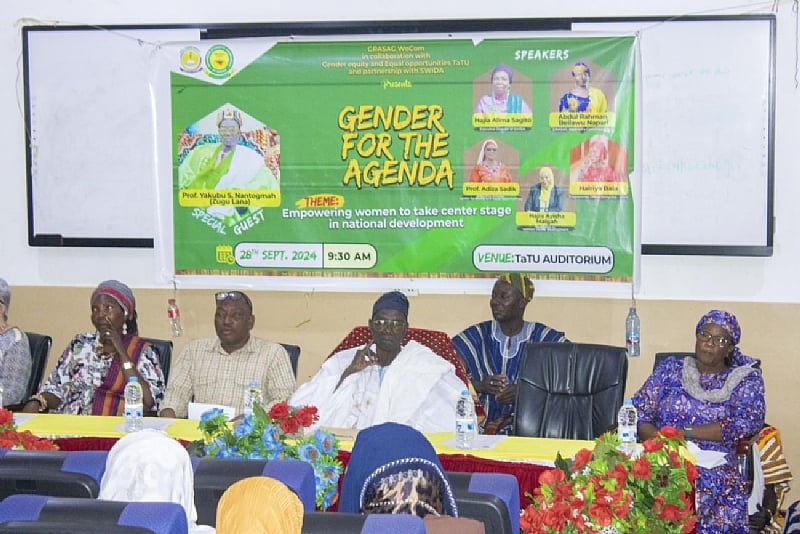The Graduate Students Association of Ghana (GRASAG) at Tamale Technical University (TaTU) recently held a significant forum titled “Empowering Women to Take Center Stage in National Development.” Organized in collaboration with the Gender Equity and Equal Opportunity program at TaTU, as well as the Savannah Women Integrated Development Agency (SWIDA)-Ghana, the event took place at the TaTU Auditorium in the Sagnarigu Municipality of the Northern Region. The central theme of the forum emphasized the critical need to uplift and empower women across various sectors, including governance, education, and national development. The initiative aimed to cultivate a deeper understanding of the obstacles that hinder women’s access to quality education and to advocate for equal opportunities that will enable them to participate actively in the economic, political, and social spheres.
Opening the event, Zugu Lana Prof. Yakubu S. Nantogmah highlighted the importance of nurturing young girls in educational settings to foster future leaders. He pointed out that while the government plays a role in promoting girl child education, accountability also lies within families and communities. The upbringing and preparedness of children, including providing them with sufficient nutrition and support, are essential for their academic success. By placing responsibility on both individual households and the broader community, the professor urged collaborative efforts to ensure that girls are well-equipped to embrace educational opportunities that pave the way for their personal and professional growth.
Prof. Adiza Sadik, Executive Director of the Center for Equity and Equal Opportunities, echoed this sentiment by addressing the urgent need for women’s voices to be amplified in governance and educational sectors. She articulated that by allowing women to take on leadership roles, Ghana can unlock a vast reservoir of potential that promotes progress and innovation. Prof. Sadik also acknowledged that despite the global advancements regarding gender equality, millions of women still face substantial barriers to accessing quality education due to factors such as poverty and cultural discrimination. She called for immediate action to dismantle these barriers, stressing the necessity for policies that promote equality, support women’s leadership, and expand educational opportunities for girls.
In alignment with these insights, Executive Director of SWIDA-Ghana, Hajia Alima Sagito Saeed, clarified that empowering women does not merely mean elevating them to ornamental positions but focuses on cultivating resilience and agency. Hajia Ayisha Maigah, a lecturer at the University for Development Studies (UDS), also contributed to the dialogue by arguing that the empowerment of women is crucial to stimulating economic growth and aligning with Sustainable Development Goal (SDG) five, which advocates for gender equality. Their contributions reflected a shared understanding that the advancement of women is inextricably linked to broader economic and social development goals.
GRASAG Women’s Commissioner, Abdul Rahman Beilawu Napari, provided further context by illustrating the challenges that cultural norms impose on women’s participation in economic and political spheres. She noted that persistent stereotypes often marginalize women from decision-making roles, thereby hindering equitable representation and governance. The forum aimed to address these societal attitudes and reinforce the notion that gender equality is essential not only for achieving sustainable development but also for fostering effective governance.
In conclusion, the GRASAG forum at TaTU served as a vital platform for discussing the empowerment of women in Ghana, emphasizing their crucial role in national development. The collaborative efforts of GRASAG, TaTU, and SWIDA-Ghana signal a commitment to breaking down the barriers that prevent women from taking up leadership positions and accessing quality education. Key insights from the participants underscored the necessity of familial involvement and community support in nurturing future women leaders. By continuing to advocate for gender equality and challenging longstanding cultural norms, the forum aims to inspire innovative policies that will drive inclusive progress in Ghana. The discussions from this event not only highlighted the dedication of various stakeholders to empowering women but also set the stage for sustained dialogue and action towards achieving gender equality in all sectors of society.














